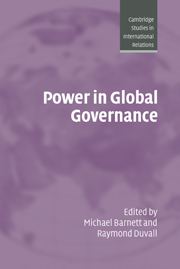Book contents
- Frontmatter
- Contents
- Notes on the contributors
- Acknowledgements
- 1 Power in global governance
- 2 Power, institutions, and the production of inequality
- 3 Policing and global governance
- 4 Power, fairness, and the global economy
- 5 Power politics and the institutionalization of international relations
- 6 Power, governance, and the WTO: a comparative institutional approach
- 7 The power of liberal international organizations
- 8 The power of interpretive communities
- 9 Class powers and the politics of global governance
- 10 Global civil society and global governmentality: or, the search for politics and the state amidst the capillaries of social power
- 11 Securing the civilian: sex and gender in the laws of war
- 12 Colonial and postcolonial global governance
- 13 Knowledge in power: the epistemic construction of global governance
- References
- Index
- CAMBRIDGE STUDIES IN INTERNATIONAL RELATIONS: 98
3 - Policing and global governance
Published online by Cambridge University Press: 22 September 2009
- Frontmatter
- Contents
- Notes on the contributors
- Acknowledgements
- 1 Power in global governance
- 2 Power, institutions, and the production of inequality
- 3 Policing and global governance
- 4 Power, fairness, and the global economy
- 5 Power politics and the institutionalization of international relations
- 6 Power, governance, and the WTO: a comparative institutional approach
- 7 The power of liberal international organizations
- 8 The power of interpretive communities
- 9 Class powers and the politics of global governance
- 10 Global civil society and global governmentality: or, the search for politics and the state amidst the capillaries of social power
- 11 Securing the civilian: sex and gender in the laws of war
- 12 Colonial and postcolonial global governance
- 13 Knowledge in power: the epistemic construction of global governance
- References
- Index
- CAMBRIDGE STUDIES IN INTERNATIONAL RELATIONS: 98
Summary
In a brilliant discussion of power in world politics, Cynthia Enloe has argued that, while much of international relations scholarship has been obsessed with power, the discipline has in fact dramatically “underestimat[ed] the amounts and varieties of power it takes to form and sustain any given set of relationships between states” (1996: 186). She criticizes in particular the tendency of IR scholars to study only the powerful on the assumption that such a focus will provide insights into and explanations of world politics. Instead, she argues, if we focus on the “margins, silences and bottom rungs” (ibid.: 188), we can see the myriad forms and the astonishing amounts of power that are required for the system to exist at all. In this chapter we take up Enloe's challenge. Specifically, we explore power in global governance by examining the increase in and transformation of policing that accompanies, and indeed helps to produce, the globalization of a neoliberal form of capitalist restructuring. Examining mundane practices of policing long ignored within a discipline more attentive to the upper reaches of state power enables us to demonstrate the massive amounts and the intricate relations of power that underpin what Peck and Tickell term the “neoliberalization” of social spaces and relations (2002). These policing practices, we argue, are integral to contemporary global governance and implicate power in all its forms. Beginning with coercion or compulsory power, we trace out the workings of global governance through institutional, structural, and productive forms of power as well.
- Type
- Chapter
- Information
- Power in Global Governance , pp. 59 - 79Publisher: Cambridge University PressPrint publication year: 2004
- 3
- Cited by



